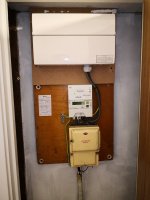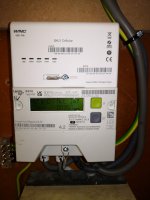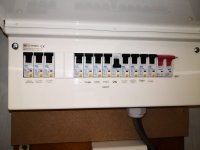Hi,
I keep reading that it's recommended to have 100 Amp fuse on your power supply for 7kw home charger, however looking at my setup I can't tell what I have.
Hoping someone here can help me.
I can see on the consumer unit that the maximum load is 100A. Is that it? or is the home charger not even connected to the consumer unit?
Sorry if my questions are dumb.
Wow ..... That is a very old MEM service head you have there my friend !.
Somebody with better experience in domestic electrics can offer some advice, but here is my view on what I see.
I would be extremely surprised too see a 100 Amp protection fuse in that service head, given it's age.
If I am reading correctly, the main isolation switch in the CU is rated at 100 Amps ?.
But I somehow doubt the main cartridge will be rated at 100 amps somehow ?.
The rating of the fuse is hidden behind that little door on the head unit.
It can not ( and should not ) be touched by ANYBODY but the DNO.
As you can see, the door is correctly protected by a stiff wire and a crimped lead seal.
Our house was built around 1981 and the DNO commissioned the property with a 60 Amp rated fuse.
Every other house close by, are ALL running on 60 Amp fuse's as well, it was considered MORE than enough back then.
Just to say, that a 7 kw wall box WILL run on a 60 Amp fuse with no problem at all.
I have been doing this for almost seven years now.
You just have to give a bit of thought to what and when, you will be placing a high demand on the system.
I ( like a lot of EV owners ) conduct their charging using cheaper off peak electric.
Charging in the early hours of the morning.
At this time, very little other power is being used, so not much chance of over loading the main fuse then.
But upgrading to 100 Amp fuse is now recommended, due to the increased demand of other electrical appliance we all are running these days !.
They are very likely to upgrade the size of the meter tails and install a 100 amp isolation switch at the same time.
It will depend on your DNO on just how they treat the upgrade process.
Some will upgrade from 60 to 80 FOC but then charge for an upgrade to 100 Amps.
Why ? - Because a 60 - 80 can sometimes be achieved by just switching out the main fuse cartridge in the service head.
To install a 100 Amp protection fuse, the service head needs to totally replaced first.
I think this will be the course of action in your case.
They will also check is you are on a "Shared / Looped" supply.
If so, this will require a LOT more work to split the supply.
Others will upgrade to 100 Amps FOC regardless ?????.
I your situation, I recommend you contact your local DNO - ASAP.


